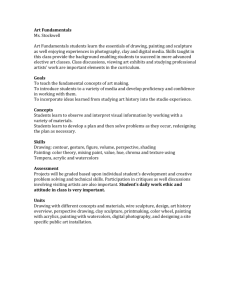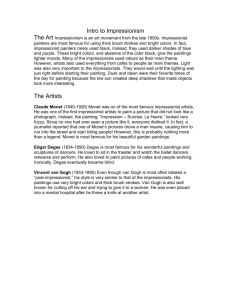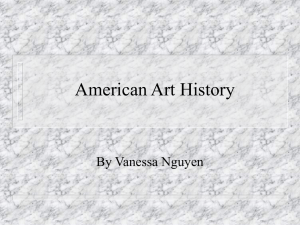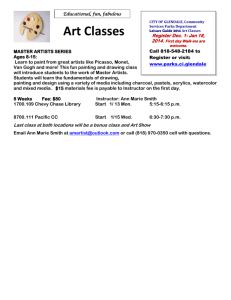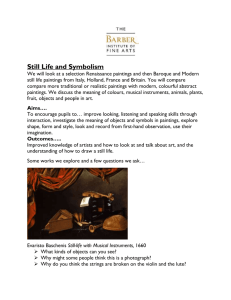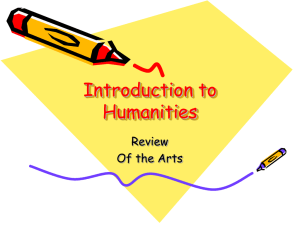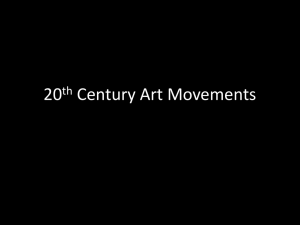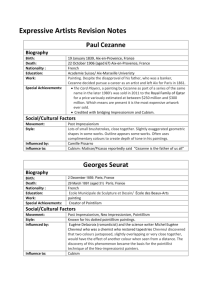Mona Lisa Outline II
advertisement
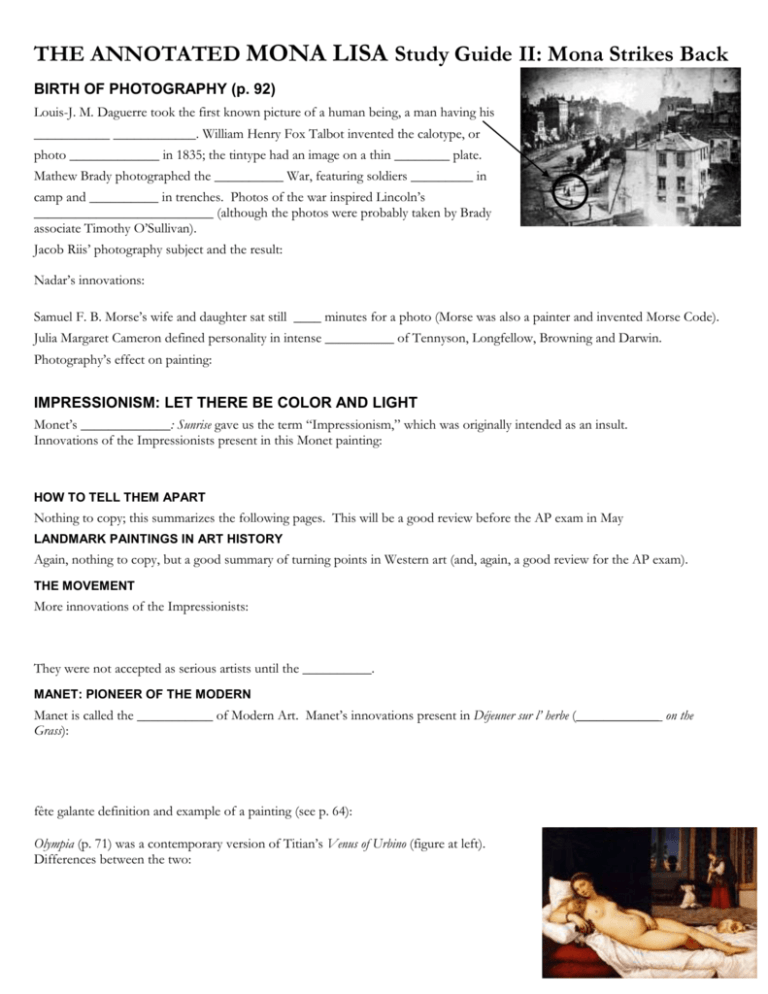
THE ANNOTATED MONA LISA Study Guide II: Mona Strikes Back BIRTH OF PHOTOGRAPHY (p. 92) Louis-J. M. Daguerre took the first known picture of a human being, a man having his ___________ ____________. William Henry Fox Talbot invented the calotype, or photo _____________ in 1835; the tintype had an image on a thin ________ plate. Mathew Brady photographed the __________ War, featuring soldiers _________ in camp and __________ in trenches. Photos of the war inspired Lincoln’s __________________________ (although the photos were probably taken by Brady associate Timothy O’Sullivan). Jacob Riis’ photography subject and the result: Nadar’s innovations: Samuel F. B. Morse’s wife and daughter sat still ____ minutes for a photo (Morse was also a painter and invented Morse Code). Julia Margaret Cameron defined personality in intense __________ of Tennyson, Longfellow, Browning and Darwin. Photography’s effect on painting: IMPRESSIONISM: LET THERE BE COLOR AND LIGHT Monet’s _____________: Sunrise gave us the term “Impressionism,” which was originally intended as an insult. Innovations of the Impressionists present in this Monet painting: HOW TO TELL THEM APART Nothing to copy; this summarizes the following pages. This will be a good review before the AP exam in May LANDMARK PAINTINGS IN ART HISTORY Again, nothing to copy, but a good summary of turning points in Western art (and, again, a good review for the AP exam). THE MOVEMENT More innovations of the Impressionists: They were not accepted as serious artists until the __________. MANET: PIONEER OF THE MODERN Manet is called the ___________ of Modern Art. Manet’s innovations present in Déjeuner sur l’ herbe (____________ on the Grass): fête galante definition and example of a painting (see p. 64): Olympia (p. 71) was a contemporary version of Titian’s Venus of Urbino (figure at left). Differences between the two: THE SALON Dates and purpose: In 1863 they rejected _________ of 5,000 artworks; artists in the ________ des Refusés: MONET: LIGHT=COLOR What “ripped the veil away?” ____________________________ Artists Monet studied: _____________________________ Subjects Monet painted in a series (p. 101, “Cathedral Series,” “Giverny,” and at right): (NOTE: Inexplicably, the images of Rouen Cathedral in your book are reversed. Google monet cathedral columbia or go to http://www.learn.columbia.edu/monet/swf/ for a very cool Rouen series website.) Why did Monet dig a trench? Reaction to his first wife’s death: “optical mixing”: Cézanne: “Monet is only an __________, but what an __________.” RENOIR: LOVE, LUST AND LAUGHTER Renoir “never produced a _______ painting”; Renoir’s subjects: Differences between Moulin de la Galette and The Bathers:: Events in Paris and France while the Impressionists painted (WHILE PARIS BURNED): DEGAS: THE RELUCTANT IMPRESSIONIST Differences between Degas and the other Impressionists: Degas’ view of women: A TERRIBLE IMPRESSION (in the box): Adjectives that describe Degas: SUPPORTING CAST: CASSATT AND MORISOT Restrictions Cassatt faced: Compare the depictions of women by men (pp. 105, 106, 107) with the paintings of women by women (Young Mother Sewing, p. 108 and the Morisot on the right, which is in the St. Petersburg MFA) in terms of subject, point of view, composition, private/public, etc. Are there similarities by gender in the works? Monet’s Houses of Parliament: Effect of Fog 1904 in the St. Petersburg Museum of Fine Arts (MFA); details at http://finearts.org/collection/houses-of-parliamenteffect-of-fog-london/ MORE DEVELOPMENTS IN GRAPHIC ARTS Describe how an image is created for each of the following. drypoint: etching: lithograph: silk screen: JAPANESE WOODBLOCK PRINTS Japanese techniques used by European artists RODIN: FIRST MODERN SCULPTOR Michelangelo’s Bound Slave (first image at right) inspired Rodin (ro-DAHN) to revive sculpture with The Age of Bronze, whose naturalism caused critics to accuse him of using ________ casts of his subjects. How is Age of Bronze similar to Bound Slave? How is it different? The 1880 Gates of _________, based on Dante’s __________, included 200 figures including his famous “The ___________” and The __________ (both at right). How is Rodin’s sculpture similar to Impressionists’ painting? What was Rodin’s purpose in sculpting Balzac? IN THE BOXES: Camille ____________ was Rodin’s lover and collaborator who excelled as a sculptor even Rodin’s Invocation (1880) at the St. Petersburg MFA; details at http://finearts.org/coll ection/invoc ation/ as her career declined; G. B. Shaw said anyone who did not allow Rodin to sculpt him would go down in history as a “stupendous ________________”; Shaw claims he has told us all how to become great _______________. POST IMPRESSIONISM Post (after)-Impressionism lasted from 1880-__________. Post-Impressionists wanted their art to be more _______________________ than the Impressionists. THE POST-IMPRESSIONIST ROUNDUP As before, this chart summarizes the following pages, and is good for review before the AP Art History exam. SEURAT: POINT COUNTERPOINT Characteristics of pointillism: A Sunday on ________________ (an island in the Seine River) inspired Sondheim’s Sunday Afternoon in the Park with __________. TOULOUSE-LAUTREC: POSTERS OF PARIS Similarities to Degas: Personal life: Made the new form of ____________________ and the ____________________ respectable art media CÉZANNE: THE PLANE TRUTH “Reproduce nature in terms of the ______________ and the _______________ and the ________________.” “A painter possesses an _________ and a _____________, and the two must work together.” (He said Monet had one of these.) Techniques and purpose in painting Mont Sainte-Victoire more than _____ times: In Large Bathers, what has Cézanne taken from Rubens (pp. 50-51)? from El Greco (p. 45)? According to sculptor Jacques Lipchitz, his late works were the greatest source of _________________. GAUGUIN: “LIFE IS COLOR” Although he began as a middle-class stockbroker with a family of five, Gauguin moved to Brittany to find the “____________ and the ____________” for his painting. In Gauguin’s Where Do We Come From? What Are We? Where Are We Going?, at right, what is typical of Gauguin’s style? VAN GOGH: PORTRAIT OF THE SUFFERING ARTIST After seeing Impressionism, Van Gogh changed from dark to bright ____________ and from social ___________ to lightdrenched ___________ scenes; from the _______________ in peasants to the ____________ power in nature, although he was a humanitarian who planned to sell his sunflower paintings to workers for _____. Despite producing over 800 paintings (and 800 drawings), he only sold ________ painting. For Starry Night, at right, label or draw lines that reflect the book’s compositional analysis. In the boxes: Let’s get the ear thing over with: Summarize the cut ear story. How is Van Gogh’s Starry Night landscape different from Cezanne’s Mont Sainte-Victoire landscape on p. 116? What do the differences reveal about the different aims of the two artists? By the way, notice the Japanese print on the wall in the Bandaged Ear portrait on p.121. These prints (you can see one on p. 109) influenced Van Gogh to use heavy lines, broad areas of color, simplified forms, and almost no shading. EARLY EXPRESSIONISM Norwegian painter Edvard Munch produced paintings, etchings, lithographs and woodcuts that expressed modern ___________ with great power. He said that “Illness, madness and death were the black __________” at his cradle. Munch portrayed strong _____________ in his work and wanted to paint pictures that would make people remove their hats as if they were in ______________. Munch was a forerunner of Expressionism, which portrayed ____________ by distorting ____________ and _____________. SYMBOLISM Symbolists believed that believed that artists and writers should reject surface appearances for the inner world of _________________. What in The Dream (right) is typical of Henri Rousseau’s art? Both Odilon Redon and Albert Pinkham Ryder were fans of the American poet _______________ ____________ ________. How is each of the paintings to the right typical of Symbolism? Redon’s Cactus Man Ryder’s Death on a Pale Horse THE BIRTH OF MODERN ARCHITECTURE Three changes which gave birth to Modern Architecture: Louis Sullivan’s believed that “___________ follows function.” How is Sullivan’s Carson-Pirie-Scott Department Store in Chicago an example of this belief? How are Garnier’s Opera House and the 1893 World’s Fair/Columbian Exhibition (at right) not an example of this belief? Sullivan believed that ornament should be a“___________” to provide visual interest and relief from the bulk of the building. THE TWENTIETH CENTURY: MODERN ART In the twentieth century, ______________ visual reality was replaced with ___________ vision. The twentieth century proved the sharpest ____________ with the past in all of Western art. It followed Gauguin’s call for “a breaking of all the old _____________, even if we cut our fingers on the glass” (a reference to Alberti’s idea of a painting as a window ), and Jackson Pollock, in the words of Willem de Kooning, “________________ our idea of a picture all to hell.” From the list on 129, list the five 20th Century World History events you consider most important, and briefly explain why. ● ● ● ● ● FAUVISM: EXPLODING COLOR Fauvism only lasted from 1904-________. It got its name from a critic who called the artists “_________ ________” (fauves, pronounced FOAVES) because they used color without reference to actual _______________, using color to express their _____________ response to a scene. (Note that, once again, an art movement name began as an insult.) Three artists who inspired the Fauves: ____ ________, ___________ and ___________. How is Derain’s depiction of the Houses of Parliament similar to Monet’s depiction (page two, above)? How is it different? Though Expressionism is usually associated with violence, Raoul Dufy’s paintings showed it could be ______________. How is The Old King typical of Rouault’s work? TWENTIETH CENTURY SCULPTURE: A NEW LOOK Brancusi’s concerns in creating sculpture: Brancusi’s new practice in sculpting: Bird in Space is not the external form, but the _______________ of flight. TWIN TITANS OF THE TWENTIETH CENTURY: MATISSE AND PICASSO Picasso, in Cubism, broke up _____________; Matisse launched a _____________ (color) revolution. MATISSE "____________ was not given to us in order that we should imitate Nature, but so that we can express our own ___________.” Choose one of the three paintings in this section, find it on the internet and show how Matisse uses the quote above in his depiction of the subject. (Why aren’t they in color, since the section is about Matisse’s use of color?!?) PICASSO Picasso produced _________ works; he could draw like Raphael as a child, but took many years to draw as simply as children. Blue period: Picasso’s life situation, subjects and style: Rose/Circus period: Picasso’s life situation, subjects and style: How is Les Demoiselles d’ Avignon ( p. 22) similar to Matisse’s work? How is it different? Revolution in sculpture: How does the style of Guernica fit and reinforce its subject? CUBISM Cubism comes from Matisse’s insult that a Braque landscape looked like “little ______________” (another insult!) “Collage” comes from the French word “coller,” to ________________. MODERNISM OUTSIDE OF FRANCE Changes in the decade after cubism: FUTURISM Marinetti: “The __________ of Europe” What did the Futurists take from the Cubists? The Fauves? Futurist stunt in Venice: How does Boccioni’s Unique Forms of Continuity in Space reflect futurist values? (By the way, Mussolini loved these guys. That should tell you quite a bit about them. If you don’t know who Mussolini was, you should. Look him up.) CONSTRUCTIVISM: SEEING RED Constructivists’ borrowing from other movements: Purpose and style of Constructivism, including Tatlin’s Monument and Malevich’s art: Me in front of Malevich’s Suprematist Composition: White on White (1918) in the Museum of Modern Art, created to show "the supremacy of pure feeling or perception in the pictorial arts." PRECISIONISM: MODERNISM IN AMERICA How is Sheeler’s River Rouge Plant (left) typical of Precisionism? O’KEEFFE: AN AMERICAN ORIGINAL These O’Keeffe paintings are in the St. Petersburg Museum of Fine Arts (MFA). How is each typical of O’Keeffe? Poppy 1927 New YorkNight 1926 Grey Hills Painted Red, New Mexico 1930 EXPRESSIONISM: THE FINE ART OF FEELING From 1905-_______, German Expressionists believed art should express the artist’s ______________ instead of the real world, and used exaggerated ___________ and ____________ for emotional impact. Die Brücke meaning: How do Kirchner’s Berlin Street Scene and Kollwitz’s Infant Mortality use distortion to convey emotion? Are they equally successful, in your view? How Kandinsky “invented” abstract art: What aspects of Kandinsky’s painting Improvisation #1(Sea Battle) suggest the subject of a sea battle? What aspect of Klee’s painting Blue Night suggests the subject? Hitler’s Art Show: Sponsors, purpose, focus, form and translation of “Entarte Kunst”: MONDRIAN: HARMONY OF OPPOSITES De Stijl Neo-Plasticism Background, purpose and characteristics of Mondrian’s art: MODERNIST ARCHITECTURE: GEOMETRY TO LIVE IN International Style: How are the Schroeder house and these buildings examples of Gropius’ Bauhaus style? Characteristics of Frank Lloyd Wright’s architecture: How Fallingwater/Kaufmann House exemplifies Wright’s characteristics: Mies’ Seagram Building: “________ is more” Le Corbusier’s Villa Savoye: “ a __________ for living” Da dA AND SURReALISM: ART BETWEEN THE WARS Dada was founded in Zurich in _________ by a group of refugees from __________. It protested the madness of _________. Read the description of Dada in “Dada: A World Gone Gaga,*” then explain how each of the works listed below exemplify the characteristics of Dada. (*Lady Gaga’s meat dress? Very Dada, dahling.) Arp’s Mountain, Table, Anchors, Navel Schwitter’s merz assemblages Duchamp’s “readymades,” including Fountain C SURREALISM: POWER OF THE UNCONSCIOUS Characteristics of Surrealism The Dancing Lesson, the original Jan Steen painting upon which Joan Miro based Dutch Interior II, is at right. Draw a line from the objects in the original Steen painting to the “surrealized” images in the Miro. Then circle the objects that Miro invented. How is De Chirico’s work typical of what would later become Surrealism? (The painting in your book is actually Melancholy of the Politician. The Mystery and Melancholy of a Street is at right) Significance of the 1913 Armory Show: Dalí’s odd behavior: (Despite what your book says, the “lump” in Persistence of Memory isn’t “indefinable.” It’s a soft self-portrait of Dalí. More on that in class. And at the Dalí Museum.) Similar characteristic of Magritte and Dalí: PHOTOGRAPHY COMES OF AGE Your book compares the work of Ray, Atget and Cartier-Bresson to Surrealism, but those aren’t the only types of art the photographs on these pages resemble. Choose two of these photos and show how they are similar to other styles of art, such as Baroque, Realism, etc. You may use the two photographs your book mentions, and you may use a type of art more than once. AMERICAN ART 1908-1940 While artists elsewhere moved toward _____________, American artists kept the __________ tradition alive and portrayed American life. (The “Ashcan School” were also known as “The Eight.”) What in Marin’s Lower Manhattan is typical of abstract art? of the Ashcan Schoo? Bellows’ Stag at Sharkey’s: Typical of the Ashcan School: How is the Marin painting both abstract and typical of the Ashcan School? Even though he calls Modernism “dirt,” what Modernist characteristics are present in Benton’s Steel? How is Grant Wood’s American Gothic an example of American Scene/Regionalism? Your book says that American Gothic and Arrangement in Gray and Black Number 1 (popularly known as “Whistler’s Mother,” p. 87) are two of the most popular U.S. paintings. Why do you think they are so popular? How did Edward Hopper’s work differ from the Ashcan School and the American Scene/Regionalist painters? In his mature style, Romare Bearden used __________________ to depict the ______________-_______________ experience. SOCIAL PROTEST ART (NOTE: Inexplicably, The Third of May, 1808 is backwards, and the photographer is Jacob Riis, nor Rms!) What was Diego Rivera’s purpose in showing an executes Mexican peasant as Christ removed from the Cross? ABSTRACT EXPRESSIONISM Abstract Expressionism is also known as ____________ painting and the ___________ ____________ School. Your book compares it to the _________ music of Charlie Parker. It began when ___________________ artists arrived in the U.S. during World War II. Jackson Pollock’s nickname and methods: Unlike most Abstract Expressionists, Willem de Kooning kept an interest in the _____________ figure, especially women. Black Mountain College’s influence: Federal Art Project purpose and statistics “Abstract Expressionism” means that the artists on pp. 159-161 were concerned with conveying emotion through their art. Which of the works depicted are most successful in achieving that aim? Why? FIGURAL EXPRESSIONISM: NOT JUST A PRETTY FACE Jean Dubuffet practiced _________________, which means raw or crude art, imitating graffiti and the work created by those on the _____________ of society. He believed art by social ___________ was “art at its purest and crudest.” _________________ Art is work outside the mainstream produced by __________-taught artists. (It is also called Folk Art and Primitive Art). Paradise Garden: Style and purpose of Howard Finster’s art (example at right): (For an example of Florida’s Outsider artists, do an internet search for “Florida Highwaymen.”) Velázquez’s Pope Innocent X is at the right. One of Francis Bacon’s reworkings of the painting is in your book. What is Bacon’s purpose in painting his own version of the painting? Velázquez did not believe “we are all carcasses.” What is different in Bacon’s world that might make him believe it? Now that you have seen the paintings, review “The Velazquez Artistic Tree” (p. 61) to understand Velazquez’s influence. Frida Kahlo: subject and origins of art, along with bizarre death story: POSTWAR SCULPTURE Postwar materials and forms: Moore’s “Truth to the material”: Calder’s mobiles: stabiles: David Smith’s material and method; how his sculptures are similar to the New York School of painting: Bourgeois’ medium and subject: Nevelson’s medium and typical work: COLOR FIELD Mark Rothko’s style and method: In the “Ivy League” box: Rothko agreed with Harvard president Pusey that his work was “Rather __________.” (A personal note: I understood in my head what Rothko was doing, but I never got it until I saw a show of his work at the National Gallery in Washington, D.C. To see the works in a book [or projected on a classroom screen] is one thing; to stand in front of them and be overwhelmed is quite another. Which is why seeing the actual work of any artist is invaluable.) Barnett Newman created flat field of pure color sliced by off-center strips he called “_______”; instead of Abstract Expressionist energy, Newman relied on ________________. NEWMAN’S PASSION: Lee Krasner (Jackson Pollock’s wife) thought Newman was being a bit _________________ (as does art critic Robert Hughes in a video we will see in class). Both Frankenthaler and Louis ____________ thinned paint on canvases to create abstractions of pure color. THE TWENTIETH CENTURY AND BEYOND: CONTEMPORARY ART Art since 1960 has largely been in _____________ to Abstract Expressionism. The problem with assessing Contemporary art is that it is still alive and _______________. From the list on 169, list the five late 20th Century World History events you consider most important, and briefly explain why. ● ● ● ● ● HARD EDGE Hard Edge took the ______________ out of Abstract Expressionism, using sharply contoured, ___________ forms, believing “what you see is what ___________ _________.” Josef Albers taught at the _____________ and taught technical __________, not freedom; his series was an Homage to the __________. Noland’s concentric or “______________” paintings and his chevrons and ____________ canvases moved from the Abstract Expressionist’s interior to the ___________ surface. Kelly also used ___________ canvases for his boldly colored shapes; Frank Stella used mechanical drawing tools in his “______________” series and said he wanted the viewer to “see the whole idea without any confusion.” PRE-POP Jasper Johns said his art was not hostility; “It was an act of _________ ____________.” (Red, a play about Mark Rothko and his reaction to the pop artists who followed him, argues otherwise. It is one of the best plays I have ever seen. American Stage is staging a performance in the summer of 2015.) Robert Rauschenberg produced a work of art by _____________ a de Kooning drawing. Rauschenberg invented a sculpture/art hybrid he called “_______________” How is Monogram typical of Rauschenberg’s approach to art? Explain how Flag and Painted Bronze (at right) exemplify Johns’ credo in depicting “things the mind already knows” (which was the name of a Johns show at the Morean Art Gallery here in St. Petersburg a few years ago) and “Take an object. Do something to it. Do something else to it.” Purpose of “Happenings”: POP ART Pop art comes from ____________ culture such as comics, neon signs, advertising and mass culture. Prices for Pop art skyrocketed like the price of IBM ___________; one gallery near one displaying Warhol soup can paintings posted a sign next to a stack of soup cans that read “Get the real thing for ______.” (Notice that Pop art became what it ironically parodied: a mass culture style and fad. Sometimes you can’t be more ironic than the reality you are being ironic about.) Roy Lichtenstein’s subject and purpose: WARHOL: THE POPE OF POP Andy Warhol picked his subjects from ______________ and _____________ and mass-produced them mechanically. He claimed you could know everything about him from looking at the ____________ of his paintings, films, and him. How are the work of Johns, Rauschenberg, Lichtenstein, and Warhol similar to the Dada works Fountain and Karl Schwitters’ merz paintings (p. 148)? Would the works of the artists listed above have been possible prior to the twentieth century? Why or why not? Would George Segal’s depersonalized plaster have been possible before the twentieth century? Why or why not? (Segal’s statues are formed from chicken wire, which he learned to use from his father, a kosher butcher.) MINIMALISM: THE COOL SCHOOL Minimalism, according to Minimalist sculptor Judd, is “getting rid of things that people used to think were essential to _______.” They eliminated emotion, image and message, using ___________ geometric materials like metal boxes or bricks. Minimalism reacts against the swagger of ______________ _______________ and the vulgarity of ____________ art. (Another rebellion against art! This also happened with Baroque, Neo-classical, and Romantic art. It’s just happening more quickly in the twentieth century.) Internet fun! Google “Chinati Foundation.” Watch the slide show on the title page, then click “Visit,” then “Works” and the artists’ names. These works are on an abandoned military base in Marfa, Texas which Donald Judd purchased so he wouldn’t have to keep putting up and taking down his art installations in New York. (Marfa, Texas also famous for the movies Giant, No Country for Old Men and There Will Be Blood; for cowboys; and ; for mysterious desert lights. Really. I’ve been there.) CONCEPTUAL ART: INVISIBLE VISIBLE ART Conceptualists believed that painting and sculpture were __________, and that the creative ________ is essential to art, so producing an ____________ is superfluous. They went beyond the Minimalists and eliminated the art __________. Environmental Art: Robert SmithsonChristo(Christo wrapping the Biscayne Bay islands began the development of Miami as an art city—which led to Art Basel Miami Beach and helped St. Petersburg’s art city status.) How is Duchamp’s Fountain (p.148) the forerunner of Conceptual Art? CONTEMPORARY ARCHITECTURE In the 1970’s and 80’s some architects considered the Bauhaus-inspired Modernism as “polished _________”; the style, based on a grid and glass skin had become the corporate style around the world. Pei- How is Pei’s Louvre entrance similar to International Style? How does it differ? (Yann Weymouth, who studied with Pei, designed the new Dalí Museum. His sister Tina Weymouth played bass the 80’s band Talking Heads.) Innovations of Johnson’s Pennzoil Place and his AT&T Building (at right): Innovations of Piano and Rogers’ Centre Pompideau/Beaubourg: Michael Graves has done work for Disney, including the post office at Disney’s planned town Celebration and the Dolphin and Swan Hotels in Orlando. Google “Michael Graves Disney” and find a building he designed for the Disney company. Identify it, including the date, and explain how it exemplifies Graves’ ideas. It will be especially groovy to find one you have visited. (Note my little nod to Pop Art below on the left.) Characteristics of Frank Gehry’s work: (Gehry is considered a Deconstructionist.) Find a building online by Frank Gehry (other than the Aerospace Museum pictured) or one by Robert Venturi. Identify the building, including the date, and explain how it is an example of Venturi’s dictum “Less is a bore." AN ARCHITECTURAL SURVEY A good summary and a good page to review before the Big Exam. Again, nothing to write. PHOTOGRAPHY: WHAT’S NEW As before, choose three photographs that are similar to types of art. List the photos and explain why they are similar to that art. Be sure to look at p. 186. PHOTOREALISM Alternate names and style of Photo-Realism Estes (at right) subject and relation to Vermeer: Method of Chuck Close: (I pulled a prank on my nephew similar to the one named in the HANSON: PHOTO-REAL SCULPTURE item. I asked him to ask a Hanson statue at the Ringling Museum for directions. To understand why the prank worked, do an internet search for Duane Hanson and look at his statues.) NEO-EXPRESSIONISM Yet another rebellion! Choose one of the works on pp. 188-189 and show how it is an example of the style and purpose of NeoExpressionism. THE NEW BREED: POST-MODERN ART Characteristics of Post-Modern art in the 1990s: Choose one of the works by Kruger, Sherman and Longo and explain what the artist is appropriating: (Note: Longo’s works aren’t photographs; they are drawings in charcoal and graphite. This is important to remember if you visit his website (http://www.robertlongo.com/ ), which I recommend. His After De Kooning, Woman 1, 1950-1952 (right), a precise drawing of the famous deKooning work (p. 160), sold for $300.000+ at the 2013 Art Basel Miami Beach show. He should be at this year’s show as well. ) NARRATIVE ART: STORY TIME: Nothing to write. Just notice how the art described here combines the personal and the political. Also notice how art has gone in almost innumerable directions. GRAFFITI ART: How is Keith Haring’s graffiti art an extension of the pre-Pop and Pop Art movements? Skim the WHAT’S HAPPENING NOW list (p. 194). That should give you an idea of how the art world has exploded at the end of the 20th century, and why we use the umbrella term “Post-Modern” to describe it all. Welcome to the 21st Century. One last thing: on page 158 there are several definitions of art. On a separate piece paper, begin with the words “Art is…” and write how you would define art. If you have a hard time coming up with a definition, explain why you find art hard to define. Cite specific examples of art in your answer. That’s it for now. You now have a good overview of western (and a bit of non-Western) art. I hope you’ve enjoyed reading through the book, and that you’ve found some artists, works and styles that you really enjoy. You are at the beginning of a lifetime of exploration, learning and enjoyment. Welcome! I’ll see you on the first day of class. Be sure to bring this and the first worksheet on that day. Please leave your book at home. Mr. Stewart
